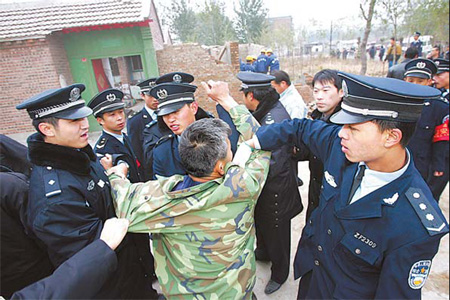Top Biz News
Scholars bid government to abolish housing law
By Wang Jingqiong (China Daily)
Updated: 2009-12-09 07:53
|
The owner of a house tries in vain to stop his illegally constructed house from being torn down in Xinzhuang village, Chaoyang district, Beijing. [China Daily] |
Five scholars from Peking University have recommended to the country's top legislature that an existing law defining the government's ability to seize urban housing should be abolished or revised to protect property owners.
In a letter to the National People's Congress (NPC) Standing Committee on Monday, scholars said the current "Housing Demolition and Relocation Management Regulation" is a breach of the country's constitution and property law.
The letter has fired up public attention across the nation, especially after the death of a resident who set herself on fire to prevent local authorities in Chengdu, in southwest China's Sichuan province, from seizing and demolishing her home.
In the letter, law professors Shen Kui, Jiang Ming'an, Wang Xixin, Qian Mingxing, and Chen Duanhong suggested that the NPC Standing Committee urge the State Council Legislative Affairs Office, the organ that issued the existing regulation, to revise or abolish the law.
|
|||
But in the housing management regulation, the rights of property owners are not specified.
The regulation also stipulates that residents have to move out once the government issues a relocation permit, with a maximum period of a year and a half for residents to relocate and negotiate compensation.
But what most often happens, experts said, is that local governments give construction clearance to estate developers or enterprises that pay off officials. It is then up to developers to negotiate with residents. If residents refuse to move, they will be forced out.
"Such twisted relations between urban development and personal property has resulted in many social conflicts," Shen told China Daily yesterday.
The top legislature would not make any comments yesterday.
However, South Metro News reported yesterday that insiders with the legislature said the State Council Legislative Affairs Office and relative government departments are indeed researching possible changes.
Shen said they felt it an obligation to push for changes after recent bloody incidents involving residents who were forced out from homes.
"It's time we rethink about the unfairness caused by, and price for urbanization and development, especially after the death of Tang Fuzhen," he said.













